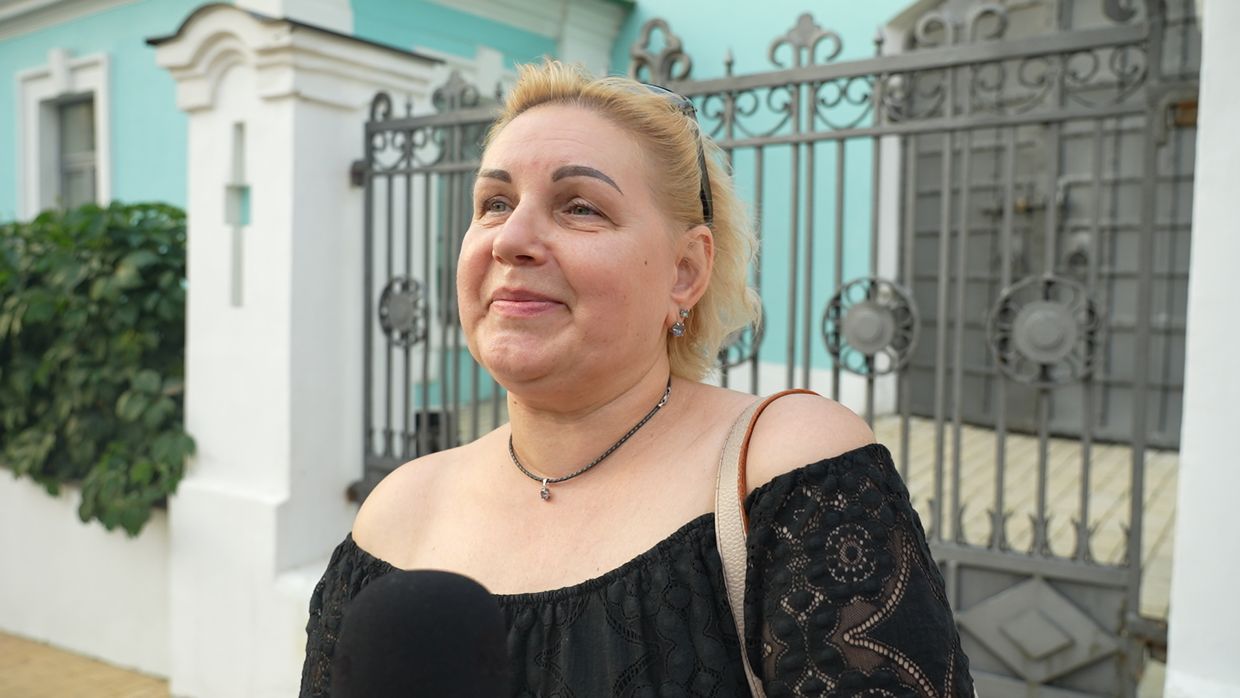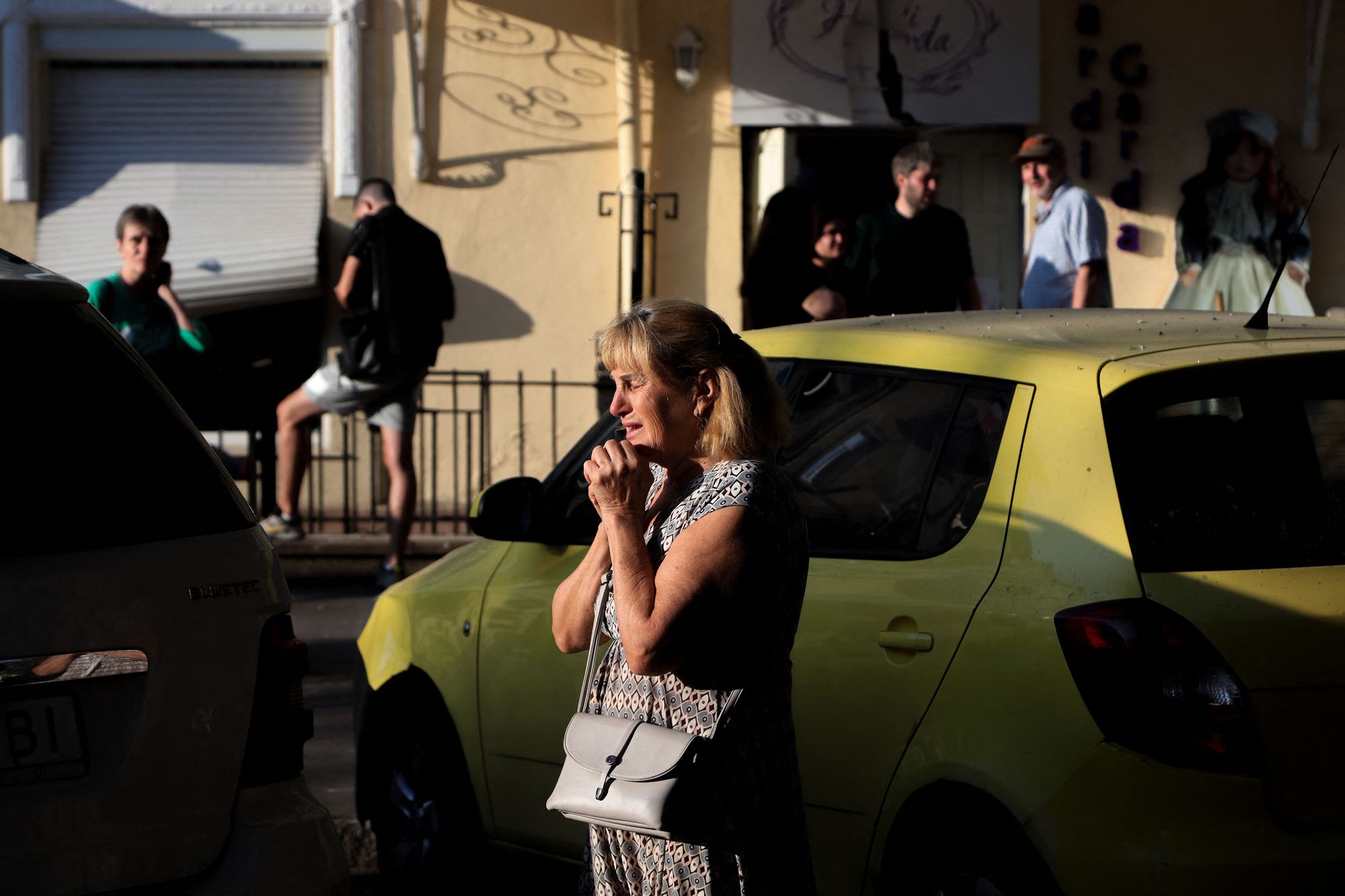Ukraine’s fight to heal millions of children scarred by Russia’s war
Editor’s note: The children’s full names are not revealed in this story to protect their identity. The location of the camp they attend is also not revealed for security reasons.
Western Ukraine — At the Gen.Camp tucked away in western Ukraine, children spend much of their day throwing frisbees across the playground, waiting for turns on the swing, and dancing to American pop music.
Their daily rhythm is punctuated by therapy. Every camper here has lost a parent in Russia’s war.
The children who have survived the worst of Russian attacks, and in some cases narrowly escaped death themselves, are the priority for the rehabilitation camp run by the Gen.Ukrainian nonprofit, its founder Oksana Lebedeva said. Since August 2022, over 300 children have come to the camp.
The number is just a fraction of the over four million children in Ukraine in need of psychological help, according to estimates provided to the Kyiv Independent by the Digital Transformation Ministry.
Many of the over 2 million children who have fled the full-scale invasion with their families may never return, which means ensuring the mental wellness of future generations in Ukraine is crucial for the country’s long-term recovery.
Initiatives like Gen. Camp provide resources to begin the healing process, but experts say rehabilitation largely depends on the system's resilience back home – from educators to family support. Raising awareness in local communities can be difficult as Ukraine continues to shed a Soviet stigma of open dialogue about mental health.
Ukrainian NGOs, international partners, and the government have been chipping away at the problem as Russia’s attacks continue to traumatize the nation.
“The biggest challenge is the scale: the scale of the humanitarian situation, the scale and variety of demands,” said the mental health program lead at WHO Ukraine, Alisa Ladyk-Bryzghalova.
“I don’t think there is a group of people (in Ukraine) that has not been involved or has not suffered in one way or another.”
‘By impacting one child, we influence the whole microsystem’
Lebedeva chose to focus on the most difficult cases after hearing about a child from Bucha who lost his father in a Russian attack, and barely survived the attack himself. After hosting the initial sessions in Spain, away from the air raid alerts in home country, the camp moved to western Ukraine in 2023. This fall, the camp is in its seventh session.
Nine-year-old Margo has been at two sessions after she escaped Mariupol with her mom, losing the rest of her family in a Russian attack. She loves making friendship bracelets, and can’t resist exchanging camp secrets with her roommates, Margo told the Kyiv Independent.

Deflection becomes difficult in therapy – where Margo is only allowed to avoid one question per meeting asked by her therapist. As she opened up during her second visit, Margo has started to internalize more tips that she can share with campers earlier in the healing process and peers back home, psychologists at the camp said.
“She can take more tools from the camp and share more of them with people around her because children are incredible therapists,” said Vanui Martyrosian, a camp psychologist. “By impacting one child, we influence the whole microsystem because they support each other and help.”
In addition to tailored rehabilitation, Lebedeva’s team also looks to scale the treatment beyond the camp’s cohorts through cooperation with the Ukrainian government.
“In 15 years, (children) will make all important decisions in this country,” said Lebedeva in an interview at the camp’s fall session. “They will become millions of adults who survived through terrible events.”
Every month counts in the race to minimize the long-term impacts of traumatic events. Communication with parents is integral to the effectiveness of therapy.
While the process of finding kids has gotten easier as she established relationships with officials and non-profits, Lebedeva still has to place calls to convince reluctant family members to send children for rehabilitation. With some, the process takes months.
“The country did not have an established culture of caring about personal mental health or the mental health of loved ones,” said Lebedeva. “Now, we are creating it in critical situations, when people are in acute grief.”
Remnants of inherited stigma
The crisis has pushed some parents and professionals working with children to seek out additional support, but the history of shame and social stigma creates additional hurdles.
“We are descendants of a Soviet society, which experienced punitive psychiatry,” said Katerina Timakina, a psychologist at Masha Fund who helps educate teachers and parents. “Seeing a mental health professional in the Soviet Union often meant more severe confinement conditions than in prisons.”
Ukrainian mental health experts say the Soviet blanket approach often came with hospitalizations, hampering of personal freedom, and future prospects for patients. Now, help is framed as a source of resilience.
Ladyk-Bryzghalova says society is moving away from the stigma as the problems become impossible to ignore, with officials nudging them in the right direction. Even word choice – communicating about mental health compared to references to psychology or psychiatry – helps to move the needle.
The national mental health program “How Are You?” initiated by First Lady Olena Zelenska set out to integrate mental health habits into the routine of the nation.
Colorful posters in the subway and coffee shops give tips on how parents can calm their kids through breathing exercises, directing them to the initiative’s website for detailed self-help recommendations. Experts say public campaigns help to scale psychological resilience while freeing up resources for in-depth care for those who need it.
Oleksandr Avramchuk, a lecturer in the clinical psychology department at the Ukrainian Catholic University, says increasing parents’ awareness helps to decrease stigma, which he explained as an attempt to “distance from what’s painful or unpleasant.”
Cases of severe grief create additional barriers for traumatized adults. When Martyrosian helped convince a grandmother to let her three granddaughters go to rehabilitation after losing her daughter to a Russian attack, the fear of separation complicated the process.
Detailed communication about the camp itinerary and the girls’ future opportunities after working with professionals helped to overcome her anxiety.
“The percentage of parents who are willing to let their kids go to therapy is much higher than it was last year,” said Martyrosian. “Despite these horrible events, society is developing.”
Experts at the Ohmatdyt National Specialized Children’s Hospital report similar trends. The pre-war hesitation about the necessity of psychological help is diminishing in the face of concerns about the child’s anxiety and behavioral changes, with parents taking a more active part in the process.
“We have an opportunity to communicate with the families, not just children,” said Olena Anopriyenko, who leads the hospital’s psychological and social rehabilitation center. “Family performs the role of a therapist. It can provide support.”
Avramchuk also views family buy-in as integral for long-term recovery.
“If the child returns to a family where everything remains unchanged and does not help to process the new (therapy) experience… the child has to decide what’s more important – parents or some stranger? Parents and peers remain a priority,” said Avramchuk.
Search for systemic solutions
International partners, NGOs, and government agencies are working to find the balance between a reactive response to crises and the need to build resilient systems for unprecedented demand. But Russian attacks continue, and exhaustion kicks in.
Ukrainian psychologists in education facilities received 5 million requests in 2023, compared to 2.5 million in 2020, according to Education Ministry data. Some 456,378 of the requests from parents, children, and educators pertained to difficulties with learning and motivation among students.
“The number of children and psychologists is very mismatched. Our school has around 2,000 students and one school psychologist,” said the deputy director of School No. 3 in the northern city of Chernihiv Oksana Kovalenko.
She called the situation critical as many families and teachers need additional support with loved ones on the front lines but realizes that the solution will not be immediate in a country at war.
As Lebedeva observes schools “ fighting for their survival,” especially in the areas under increased danger of Russian strikes, she attempts to alleviate the burden by expanding the camp toolkit to a national level with the Digital Transformation Ministry. The collaboration will include handbooks, educational series, and podcasts.
“School is at the core of the child’s social environment, and that’s where psychological reactions are often manifested,” the Deputy Digital Transformation Minister for European Integration Valeriya Ionan wrote in a comment to the Kyiv Independent. “So, it is extremely important to educate teachers on how to care for the students’ mental health correctly.”
For its part, the World Health Organization (WHO) is helping coordinate over 300 partners in the biggest Mental Health and Psychosocial Support Technical Working Group in the world in Ukraine, said Ladyk-Bryzghalova. As the additional resources flow in, coordinators are trying to connect the initiatives to expand the reach and avoid tackling the same issues repeatedly.
With increased enrollment in his program during wartime, Avramchuk is preparing new professionals for unrealistic demands in a society desperate for relief and support.
“They expect a psychologist to come and handle everything that burdens them,” said Avramchuk. “Unfortunately, psychologists are not omnipotent. They don’t have magic wands. They can’t resurrect people.”
His colleagues in local and national initiatives have been working on overdrive for 21 months, trying to handle the pressure, while also dealing with personal trauma.
“Is there a general exhaustion because you have not slept for two nights because of air alerts and you have to go to a training? Yes,” said Timakina.
When the electricity goes out during her talks, or she has to move her group to bomb shelters, thoughts of tangible impact keep her going.
“Each teacher works with 30 children. So, when I conduct training, it is not for 30 teachers; it is for 900 children,” said Timakina.
“It is a small seed that you plant, and it starts growing. It might give way to something better – a nation of strong people who are unafraid and know why they live.”












